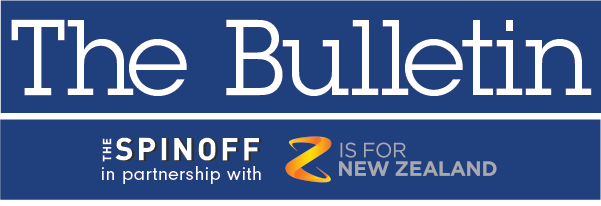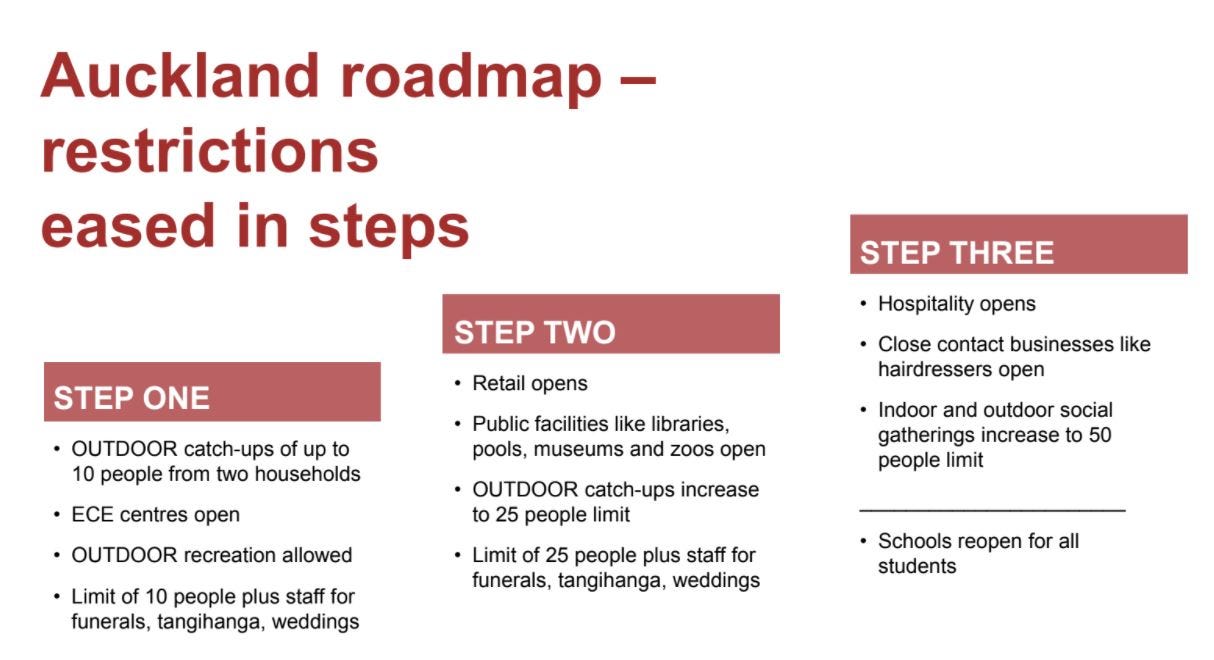NZ's Covid-19 elimination strategy ends
Auckland's lockdown will slowly ease as the government’s Covid-19 minister concedes the virus is here to stay, experts warn cases could now rise quickly
Mōrena and welcome to The Bulletin for Tuesday, October 5, by Justin Giovannetti. Presented in partnership with Z Energy.
In today’s edition: A change of heart in antivaxville; the Reserve Bank considers a rate hike tomorrow; Erebus monument blocked; but first, the end of elimination.
Jacinda Ardern and Ashley Bloomfield. (Hagen Hopkins/Getty Images)
The sense from the ground floor of the Beehive. In her opening remarks at yesterday’s 4pm briefing, the prime minister spoke about the elimination strategy in the past tense. The approach had given the country many months without Covid-19, but increasing vaccination levels and the delta explosion meant it was time to accelerate towards something different. The director-general of health then spoke about elimination in the present tense. Ashley Bloomfield said that finding cases and smashing them remains the hallmark of the country’s response to the virus.
Of the press conferences I’ve covered in the Beehive theatrette, yesterday’s was one of the most confusing. Nearly any headline I write from one part of the afternoon’s comments could be contradicted by some other portion of the two speaking. But first, let’s get into the facts from what was probably the most significant announcement since the country adopted the elimination strategy more than 500 days ago.
Auckland will remain in level three but restrictions will be phased out over the coming weeks. The Spinoff reports that the city is exiting lockdown through a new way of managing Covid-19. Instead of a move down to level two, it now needs to move up through three steps. Step one starts at midnight tonight and allows for groups of up to 10 people, from two bubbles, to meet outdoors. Kids can go for playdates, friends can meet up for a beer or walk. The talk of bubbles is gone as you can meet up as often as you'd like, within those rules. Early childhood education will return and people can move about the city for recreation like going to the beach, sailing and lawn bowls. This is not an exhaustive list, simply some highlights from Ardern. Steps two and three further relax restrictions, but moving to them isn’t based on vaccination levels, rather cabinet’s discretion.
Four to eight weeks. That’s the expected time necessary to move up the steps, according to Bloomfield. It marks the transition from the elimination strategy to what comes next. From tomorrow, that means the period could stretch out to Dec. 1.
Covid-19 will remain in New Zealand. Speaking after the press conference, Covid-19 minister Chris Hipkins said the country can no longer eliminate the virus, according to the NZ Herald. "We have been trending in that direction for the past few weeks and I think people won't be too surprised by that," he said. Less than a week ago, Hipkins stood in parliament and said that the National party’s Covid-19 plan would allow the virus into the country at Christmas.
Beyond the new steps in the alert levels, very little else is clear. Make no mistake, while the rules are changing in New Zealand and the clarity of the four alert levels is gone, the country now finds itself in a position people from around the world have been in before. According to the prime minister, this was always the plan. Without certainty, Aucklanders will need to deal with significant grey area and interpretation is now key. In many cases, even officials won’t know. As an example, I asked yesterday whether you can pop into a friend’s house to use the toilet after some wines in the backyard. Ardern said no: “If you don’t have a good bladder, don’t stay for long.” Bloomfield then said that it would be fine provided you went in the house alone. This is the messy world of dealing with Covid-19.
There are other pressing questions that are significant. Jack Tame wrote for One News that the government’s plan is a roadmap without signs. The plan has no vaccination targets, something that is at the centre of Australia’s reopening efforts, as well as no dates and no metrics to use to understand cabinet’s thinking. The plan is silent on what happens if case numbers increase, something modeller Shaun Hendy has warned is now inevitable, according to Stuff. There’s no mention of what will happen with Auckland’s border, nothing on vaccine mandates and no hint of what comes next. This new plan doesn’t end with Auckland moving to level two. Once the city hits level three step three, “we will likely move to a framework that then reflects a more vaccinated population,” said Ardern.
Increasing numbers means increasing strain on the health system. New Zealand intensive care specialists have in recent days warned, according to Newshub, of the risks of a widened outbreak on their limited resources. As modelling expert Michael Plank noted in comments to the Science Media Centre yesterday, “the Australian state of Victoria has gone from around 20 cases per day to 1,500 in just six weeks, and there are currently 96 Covid patients in ICU. This could happen here and it would put immense pressure on our hospitals.”
A guide to the new plan for Auckland.
If you like what you’re reading, we need your support. The Spinoff is doing our utmost to keep you updated on Covid-19 related news. Every dollar our members contribute directly funds our editorial team and is devoted to ensuring we do more. Click here to learn how you can support the team today.
Waikato's antivaxville has had a change of heart on Covid-19. The Waikato Times reports that vaccination rates are up sharply in Raglan after the town faced infectious cases of the delta variant in recent days. Raglan was given the antivax name due to its low childhood immunisation rates during the 2019 measles outbreak. While some locals may have had similar thoughts about Covid-19, that changed with the cases. Over the weekend, the lines for tests in Raglan often saw people then go for a vaccine for good measure, while other locals told the newspaper that this was their first vaccine ever.
The Covid numbers: 28 new community cases were reported yesterday in Auckland and 1 in Waikato. 58% (19) of the previous day’s total were in the community while infectious. There are now 275 active cases. 27,033 people were vaccinated on Sunday, of which 74% were second doses.
The Spinoff’s Covid data tracker has the latest figures.
Construction of Auckland’s Erebus monument blocked as group warns of another Bastion Point. A national monument to the worst civil accident in New Zealand’s history shouldn’t go ahead at its current location in Dove-Myer Robinson Park, according to local Māori leaders who say they have been ignored. Te Ao Māori News reports that construction signs on the site have been repurposed by protestors for rāhui notices. In response, construction has stopped as the government has planned to begin talks.
The Reserve Bank could hike interest rates tomorrow, but Auckland’s long lockdown has made things complicated. As RNZ reports, the bank had planned to increase its cash rate in August, but stopped at the last minute as Covid-19 re-emerged in Auckland. Bank officials said at the time that the call to raise the rate, for the first time in seven years, had been unanimous. However, according to Interest the bank’s outside panel of experts is now calling for patience as hard restrictions remain for one-third of the country. Despite the end of elimination, lockdown is here to stay.
A long waiting list for opioid treatment in Otago is angering doctors. The Southland Times reports that nearly 500 patients who have come forward have been left waiting for help because of shortfalls in the local health board's programmes. One woman with children, seeking an opioid treatment, was left in limbo for nearly a year. Doctors say health staff are burning out because of the heavy workload looking after patients who aren’t getting enough assistance and the number of referrals is increasing rapidly.
Got some feedback about The Bulletin, or anything in the news?
Get in touch with me at thebulletin@thespinoff.co.nz
Right now on The Spinoff: Toby Manhire explains what the new rules are for level 2.75 (aka level three, step one). Gerard Barbalich writes about three practical questions to ask the vaccine hesitant. Timothy Welch wonders why if city land is so valuable in New Zealand, do we use so much of it for parking? Leonie Hayden has a very pointed message for some Aucklanders who insist on going maskless. Mirjam Guesgen reports on the suprisingly unclear science behind pregnancy and cannabis.
All Blacks coach ‘commiserating’ after winning Rugby Championship, losing to South Africa. Ian Foster told Stuff that the team won't get to see family and has to stay in Australia before it heads to the US and Europe for more games. Foster, now in a Queensland hotel, is looking over his players and said he’s learned a lot after a loss over the weekend. Beauden Barrett in particular is one he’s looking at improving before facing northern hemisphere rugby.
That's it for The Bulletin. If you want to support the work we do at The Spinoff, please check out our membership programme.








